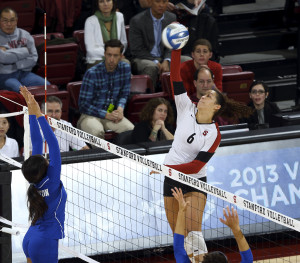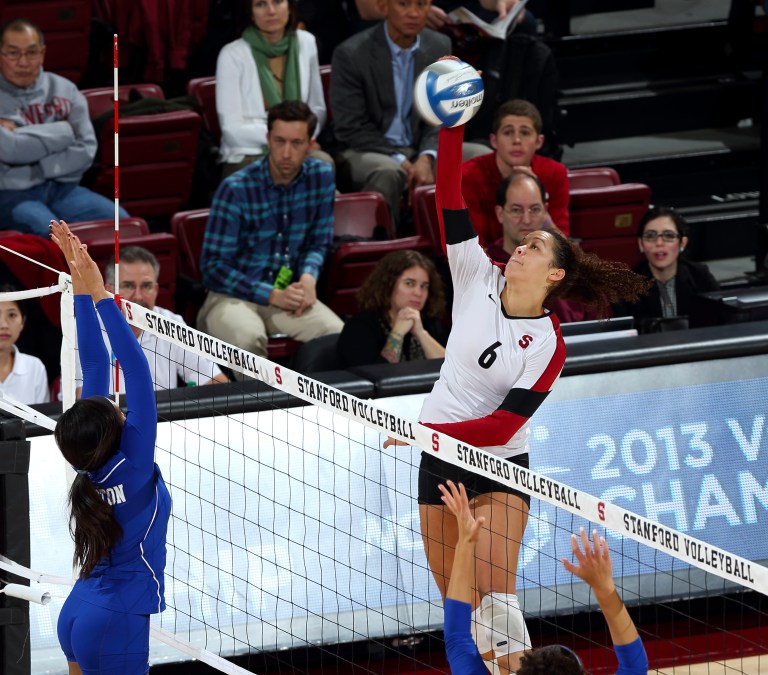Falling short of the Final Four and its ultimate goal of a national championship, the No. 7 Stanford women’s volleyball team (27-6) was defeated by No. 2 Penn State (32-2) in a five-set thriller in the Lexington, Ky. regional final on Saturday, 25-22, 22-25, 26-28, 25-18, 11-15.
The Cardinal entered the match playing the best volleyball it had all season, riding a season-high 12-match winning streak in which it had dropped only three sets. However, the team was still viewed as an underdog against the Big Ten champion Nittany Lions, who seemingly mirrored Stanford with a very similar hard-nosed style of volleyball anchored by a strong block.
The matchup was certainly more suited for next week’s semifinal in Seattle — the Cardinal was somehow seeded below both its final regular season RPI (No. 6) and AVCA (No. 3) rankings and was hence dealt a tougher tournament draw.
The two evenly matched teams were separated by more than five points just once in the match when Stanford completely seized the momentum from Penn State in the fourth set to tie the match at two games apiece. The Cardinal took that advantage into the first-to-15 fifth set, jumping out to a 9-6 lead and looking ready to book its first trip to the Final Four since 2008.
“We fought back when a lot of people thought we were done, and that’s just how we play,” said sophomore middle blocker Inky Ajanaku. “We were not going to go down without a fight, and we gave one hell of a fight.”
Despite Stanford’s early fifth-set lead, Penn State took advantage of a timeout to break off a six-point run to jump in front 12-9. It became increasingly difficult for Stanford to get any balls over due to Penn State’s 6-foot-6 senior middle hitter Katie Slay controlling the net as she earned three of her match-high 10 blocks in the final game. Five points later, Penn State took the set and the regional, 15-11.

“We played with our hearts and put everything that we had out on the floor,” said head coach John Dunning. “I know how hard they worked to get here. As a coach, what you want is for people to be able to enjoy the things that they worked so hard for and when you get to here and you can’t, it’s tough.”
The match started off exactly as expected between the two elite teams, with 13 ties and seven lead changes in the first game. The Cardinal had to deal with the big Penn State front from the beginning, which made its presence felt with six blocks in the first set — including three from Slay — to outdo its nation-leading 3.10 blocks-per-set average. Perhaps nothing evidenced the strength of the teams’ defenses more than their hitting percentages in the set: .114 to .049 with the advantage to the Cardinal.
Stanford found itself behind 19-15 late in the set but completely took control after senior outside hitter Rachel Williams sunk a tip shot to get over the Penn State front line. Williams led both teams with five of her 17 kills in the match coming in the first set. The Cardinal proceeded to take a 21-19 lead after winning six consecutive points and later finished on a 10-3 run to take the first game.
The teams traded points for most of the second set until the momentum swung when Penn State won an outstanding point with the score knotted at 14. While Stanford connected on multiple powerful swings in the rally, the Nittany Lions consistently dug them, with one particular ball dug on a diving play by junior defensive specialist Lacey Fuller and being saved by junior setter Micha Hancock running around the net pole before later being killed. From there, Penn State extended its lead to four and later sealed the game, 25-22.
The Nittany Lions carried their momentum into the all-important third set, winning the first three points and never surrendering the lead. Although they led by as much as five points at 17-12, the Cardinal charged back and made it interesting at the end. Stanford tied at score at 23 after consecutive kills by Williams, but Penn State quickly earned set point after a timeout. Stanford extended the set by saving three set points but was unable to string together consecutive points as Penn State took the set 28-26.
Stanford dominated the fourth game, led by Ajanaku’s set-high five kills and two blocks. Penn State service errors also helped the Cardinal out, as four of its 10 total in the match came in the fourth set. Even Hancock, who entered the regional ranked second in the nation with 0.65 aces per set for the Nittany Lions, had just two aces to five service errors in the match. Stanford took the set 25-18 before falling in the fifth and deciding set.
“This whole journey through the season, especially these last few weeks, has been the most fun times we’ve ever had and not just because of the matches, but because of the people we did it with,” said sophomore outside hitter Jordan Burgess. “Of course we wanted to win it but I wouldn’t have wanted it to go any other way if we had to lose, and I’m really proud of all the girls we played with.”
Burgess and sophomore setter Madi Bugg were named to the Lexington all-regional team after the match. In addition to its six players who were recognized on All-Pac 12 Conference teams, Stanford can add to its accolades later this week when the AVCA All-Americans are announced at the association’s annual conference in Seattle.
Although the Cardinal was not able to advance further in the postseason than it had in 2012, this season will not be looked upon as a disappointment. After a five-set loss to then-No. 4 USC in the middle of conference play, Stanford emerged with a stronger resolve and rattled off a season-long winning streak with its sights set on a championship. Even so, handed a tough draw in the tournament, the Card knew that its date with Penn State would be its toughest match of the season.
Next year, Stanford will be without Williams and senior middle blocker Carly Wopat, the 13th and 14th players with 1,000 career kills for the Cardinal since 1986. Wopat’s strong net presence will especially be missed, as her 614 career blocks rank third in Stanford history. Still, the Cardinal will keep five of its seven starters — a core of four starting sophomores plus junior libero Kyle Gilbert — in hopes of making a longer run next season.
“You have to take a look at all that is built and the people who are in the process and be happy for them,” remarked Dunning, “because of all the things they have learned about themselves and about friends and teammates.”
Contact Jordan Wallach at jwallach ‘at’ stanford.edu.
